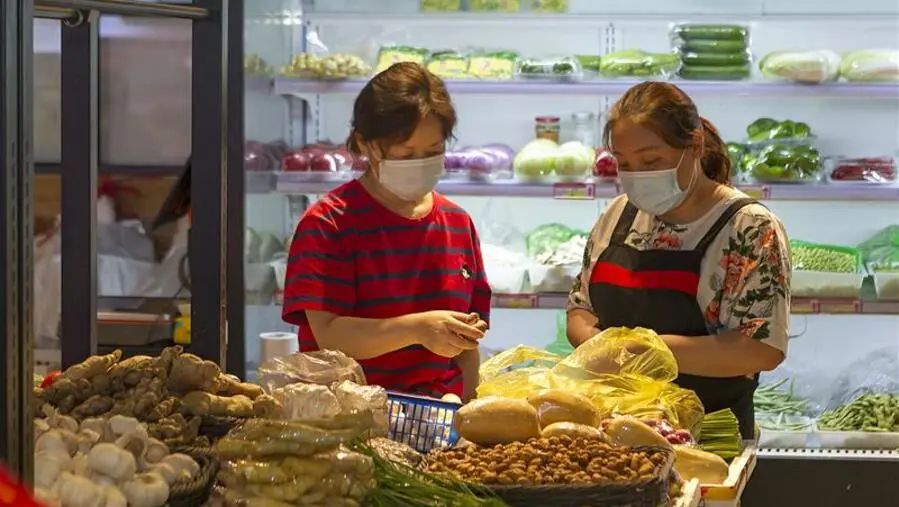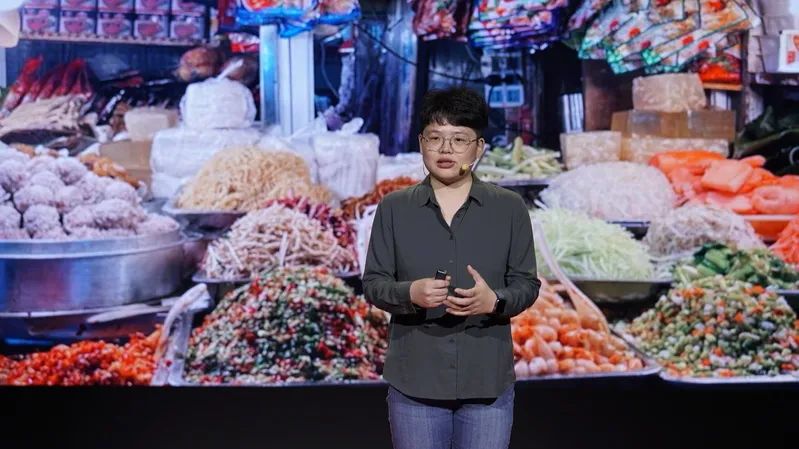The American cuisine is replaced by the supermarket, but there are still more than 800 vegetable farms in Shanghai. Why is the vegetable market endless in China?
Author:Jiefang Daily Time:2022.07.16
The vegetable market is the epitome of society. In China, the cities with the most vegetable markets are Shanghai, Guangzhou, and Nanjing. Not long ago, Zhong Shuru, a special associate researcher at the School of Tourism of Sun Yat -sen University and a doctor of anthropology, shared his research on the vegetable markets of China in a "one" speech. The following is the main content of the speech.

There is still a huge living space in the vegetable market
When I was young, I liked to go to the vegetable market with my mother. After going to college, my roommate and I often went to the vegetable market in the school's small west gate. The things there were fresh and cheap. We bought it back and made hot pot in the dormitory.
When I went to the United States to study in graduate students, I discovered that the United States had no vegetable market. The United States is full of supermarkets. Like Lao and the United States, I go to the supermarket to buy things once a week and fill in the refrigerator.
The United States has gone through a "Retail Revolution" in the 1970s, which is a process of replacing traditional small markets by supermarkets. Nowadays, more than 80%of the food retail channels in the United States are controlled by the chain supermarket giants such as Wal -Mart, and there are few traditional small markets.
On the other hand, the vegetable market that the people depend on survival are often "dirty and messy". The ground is wet on the ground. There is no way to go down. There is a strange taste in the vegetable field. Compared with the supermarket, there are small stalls in the market, and their economic efficiency is not high.
In 1995, Carrefour officially entered China, and then Wal -Mart also came. Many chain supermarkets appeared in our homeland. At that time, experts and scholars predicted that we would also experience the "retail revolution" like the United States. The vegetable market will disappear in the near future and be replaced by supermarkets.
However, more than 20 years have passed, and this prophecy has not come true. According to the latest data, there are more than 800 vegetable markets in Shanghai, 584 vegetable markets in Guangzhou, and 360 in Nanjing. In these most developed cities in China, the vegetable market still has huge living space.
Why is the vegetable market endless in China?

Zhong Shuru was in his speech. (The picture is provided by a "one seat" speech)
I conduct field surveys in Hainan
The vegetable market originally originated in the Song Dynasty in China. The Song Dynasty Fang City is divided into the place where "Fang" is where the "city" is the market and the prototype of the vegetable market. The modern indoor market first appeared in Shanghai. The famous triangular ground vegetable market in Shanghai was used to buy food for foreigners in the concession.
After the founding of New China, the vegetable market has become a core part of our national food circulation system. At that time, we adopted the unified purchase system, from the food collected from the countryside, and the flow of the vegetable market in the city, and people had to use ticket vouchers to go to the vegetable market to buy things. Essence
By the 1980s, the reform and opening up, the wallets of ordinary people were drumming, and various consumer demand became more and more vigorous. At this time, the "vegetable basket project" appeared. With the encouragement of this policy, the vegetable markets in various places have begun a new round of construction. Most of the vegetable markets we see now were built during that period.
Because of the strong interest in the vegetable market, when I was studying for a doctorate in anthropology in the United States, I set the topic of doctoral dissertations as "Chinese vegetable market research".
I chose to conduct field investigations in Hainan. In 2016, I stayed in Hainan for a year and two months, visited the vegetable markets in 17 cities and counties, and met many interesting people and things.
I rented a small house next to a large market. I pushed the window every morning to see the fish stalls, and I heard that the fishmongers were selling there. I was very excited at the time because all this was new to me.
In order to get close to those vendors, I first introduced myself and said that I came to investigate, but these stall owners were very alert, thinking that I was here to spay their business secrets, or they wanted to come here to set up stalls. Shock my head straight.
In the end, I started my vendor career at a stall selling horse mackerel relying on acquaintances. Not only do I sell fish, but also sell vegetables and pork. In this way, I walked into their lives. Like them, they went to the dock to purchase and delivered the goods to the guests. I was invited to eat and coach their children's homework, and even helped them write a marriage agreement. I slowly gained their trust.
From them, I discovered the true side of the vendor's life, and also found the true side of the vegetable market.
The life story of 113 vendors
During the investigation in Hainan, I recorded a total of 113 real life stories of the vendors.
Sister Hui is one of the stall owners. She has three connected stalls in the vegetable market, with an annual income of more than 200,000 yuan.
Sister Hui dropped out of school when she was 8 years old. Like many vendors, her culture is not high, but this does not prevent her from doing business. When Sister Hui was 13 years old, she followed her mother to sell fish on the streets. They had no money to rent a booth in the market and could only start with the stalls.
Since the age of 15, she has worked alone. Sister Hui summarized her two most important business scriptures: First, diligence. She is basically full of year, starting the stalls from 5 am every day, until 8 pm. The second is integrity. She has never lacked two less than two. After getting married, her husband Cheng Brother provoked the burden of supporting the family. At two or three in the morning every morning, Chengge went to the fishing port to purchase. There were 20 or thirty types of fishing every day, and then shipped to the booth for Sister Hui to sell.
There are several different sources they sell. The first is the fisherman of the boat, and the fishing of the boat is relatively fresh. However, if you want to get a boat fishing, you must know the boatman. The second source is the ocean fishing of the big ship. Because the fishing amount of large ships is relatively large, fishing is often sold through substitute sales. In order to obtain the agency right of a large ship, it is necessary to form a binding relationship with the large ship at the beginning. Sister Hui's uncle, cousin, and brother -in -law all have their own fishing boats, so they will take care of Sister Hui in business. Cheng Ge had been a boatman on the dock before. He and the agency were very familiar with the sales, so their business could do so well. The dock is basically an acquaintance society. It is based on this stable social network. In addition, they can ensure that the seafood that can be salvaged can reach people's dining tables in a very short time. In addition, fishing is eaten by the day. The output of seafood fluctuates very much, so these fishing wins will not flow into the supermarket, but flow into the vegetable market through various business relationships. Hainan people are inseparable from sea fish. Only the vegetable market can meet their needs for seafood and diversified needs.
I also know a stall owner who sells pork. He has sold pork in the vegetable market for more than 20 years, and is now in his 50s. He was initially brought by one of his cousins, and they were all from Hainan Wanning. There is a phenomenon in the pork industry, called "fellow villagers and peers". Basically, half of the stall owners selling pork in Hainan are all Wanning.
Uncle's income changes with the fluctuation of pork market. When the price of pigs is high, everyone's consumption of meat is relatively low, and pork is not sold well. Generally speaking, when there are fewer pigs, you can only earn two or three hundred yuan, and you can earn thousands of yuan. The price fluctuates very much. Of course, sometimes you lose money.
When I was young, I sold two or three pigs a day, earned a lot of money, and bought a house in the city center. Now, he and his wife sell only one pig a day, because although the economic conditions are good, they do n’t know what to do except selling pork, they should exercise. At 5 o'clock in the morning, they came to the pork on time to open the stall.
There are many old customers in the Biao uncle. Among them, there are Hainan powder shops and Xiangwei Hotels, and there are also seafood shops and breakfast shops. The surrounding small commercial and vegetable market vendors are very closely connected, and they have formed a relatively mature business network. In addition to giving them pork, uncle Biao sometimes helps them bring some seasonings, vegetables, etc. by the way. According to my statistics, 61%of the vendors maintain this stable business relationship with the surrounding small commerce.
In fact, the vegetable market is the lifeblood of non -chain small catering, and it continues to supply authentic ingredients to these small catering. Without the vegetable market, then these delicious small restaurants may disappear, which is also a very important reason why the vegetable market can bring vitality to itself.
"Migratory Bird Old Man" from the Northeast
In addition to knowing the lives of vendors, I also want to know those customers who buy food. Hainan people like to take a walk at the beach after meals, so I found more than 300 people to chat at the sea. I found that more than 100 of these more than 300 people came from the Northeast. This group of people had a special name called "Migratory Bird Old Man".
Aunt Mei is one of them, she is from Jilin. She and her wife are sixty or seventy years old. They come to Hainan every November and return to Jilin when the spring of the following year. Because Hainan's climatic conditions are good, these elderly people from the Northeast like to spend winter here. According to statistics, there are more than 1.5 million "migratory birds" who go to Hainan every year like Aunt Mei. This is a considerable number, because the population of Hainan Province is more than 8 million.
For these elderly people, the vegetable market is a window that understands the local and integrated into the local area. Through the vegetable market, they can slowly find out the context of strange cities. Which vegetable market sells food is delicious, which vegetable market is cheaper, and which vegetable market has special things they like, they all touch it, because they have time, and visiting the vegetable market is their most important leisure activity. Essence
Aunt Mei likes to visit the morning market, and the morning market is specially designed for the "Migratory Bird Old Man". It only set up a stall in the six months of the "Migratory Bird Old Man", from 4 am to 7 am. You can buy a pound of Chinese cabbage in the market. In Hainan, a pound of Chinese cabbage is "cabbage price". Why can it be so cheap? Because there are dishes that can't be sold in the morning market, there are varieties that have to be sold. In a word, the characteristics of the morning market are cheap, and you can also bargain in the morning market. For the generation of Aunt Mei, frugality is the habit of their bones, so visiting the morning market has become part of their lives.
In addition to visiting the morning market, Aunt Mei also likes to take bus from the urban area, spend an hour and a half to the free market in the suburbs, and buy two cucumbers and several mangoes. These things are produced nearby, and the process of seeing them from the fields to the market. Aunt Mei told me that she didn't go to the vegetable market to buy something. She just saw that there were so many people in the vegetable market and had so many fresh foods, and she felt very secure and pleasant. Therefore, for the elderly, the vegetable market still has very important social functions. This social network is regardless of gender, no background and income.
In the vegetable market, thousands of interesting people and things have a furnace, creating a very grounded field of life. The future of the Chinese cuisine market
In recent years, I have seen some vegetable markets in the city have been transformed. The transformed vegetable market has greatly improved in terms of ventilation, lighting, and drainage, and the infrastructure has been greatly improved. This is a win -win situation whether it is a merchant or a customer.
There are also some architects and designers participating in the transformation project. They have created a group of net red vegetable markets, such as Suzhou's Twin Tower Market, Shanghai's Wudo Market, and Beijing's Chaonen South Street Cuisine Market. The successful transformation of these vegetable markets indicates that the vegetable market can adapt to urban life to some extent, and it can also attract young people.
However, I also noticed that this transformation is often just surface decoration, and it does not change the business structure of the vegetable market. The original vendors in the vegetable market are still selling the original things.
Later, I came to Beijing and wanted to conduct a comparative study. I rode a bicycle, opened Baidu maps, and strolled one by one. As a result, I found that the vegetable market marked on many maps has been demolished, and some have become high -end communities.
After the vegetable market disappeared, there were some alternative forms. For example, there are many small faces in Beijing's hutongs. The merchants have transformed these small faces into places to sell meat and vegetables. There are also some small convenience supermarkets. However, there is no way to compare with the vegetable market in terms of the variety, area, area, or freshness. Moreover, the social functions of the vegetable market and the functions of connecting urban small business are also unable to replace them.
Today, the biggest problem encountered by the vegetable market is that they cannot attract young people. I learned from the Nanjing Vegetable Market Association that there are currently 360 vegetable markets in Nanjing, of which 80%of middle -aged and elderly customers, 53%of the market turnover of the vegetable market decline year by year. The reason why young people do not go to the vegetable market are very simple: I do n’t have time to cook, eat takeaway every day, who is going to the vegetable market? Even if you need to buy food on the weekend, open your mobile app, you can deliver vegetables at home in 30 minutes.
People often ask me: Do you think the vegetable market will disappear quickly? My answer is that in the foreseeable future, the vegetable market will not disappear. Because the business form of a single household in the vegetable market is well connected to the real logistics system, the community stickiness of the vegetable market is very high. It is rooted in the community. Essence These elements make it full of vitality and allow it to last longer in the city.
In fact, we need to reflect not only to buy food, but also think about what kind of diet and life we need in the future, and how we should cultivate a close relationship with food. The liveliness and humanity of the vegetable market are unique in the same life, so it will also bring me a lot of thinking.
Every city looks like a thousand cities, but there are two similar vegetable markets in the world. I very much hope that when you are free, you can go to the vegetable market. There, you will find more exciting and possibilities of life.
Liberation Daily · Shangguan News Original manuscript, reprinting without permission
Author: Zhong Shuru
Text Editor: Xu Bei
WeChat editor: nano
School pair: Feifei

- END -
Incident Fuqing!When the car falls into the water, the driver's roof is for help!

Thanks to the traffic police for the emergency rescue, otherwise I will be drowned...
The number of national railway goods continued to operate at a high level. In the first half of the year, 1.946 billion tons were sent, a year -on -year increase of 5.5 %.

From January to June of this year, the number of national railway goods continued ...